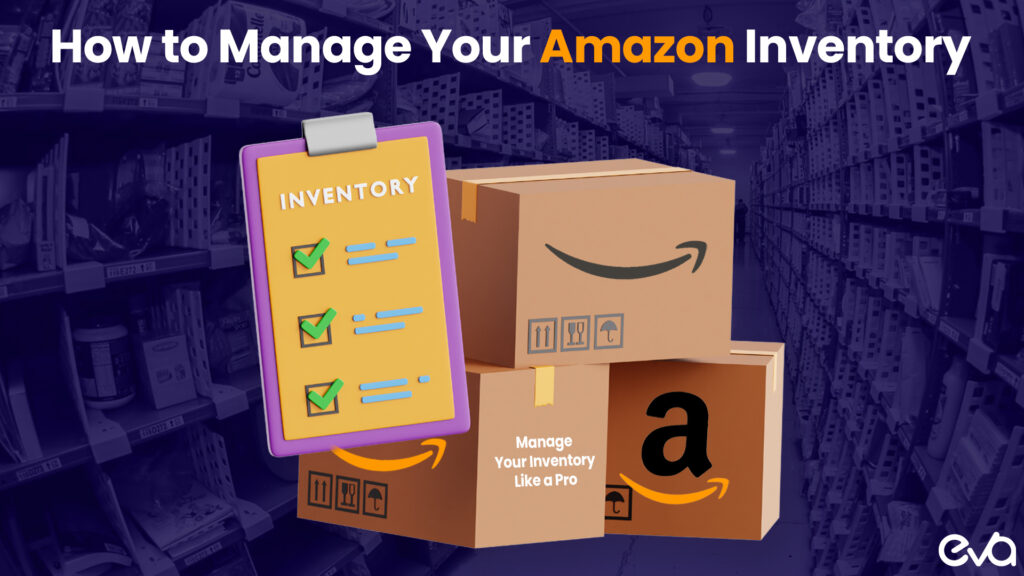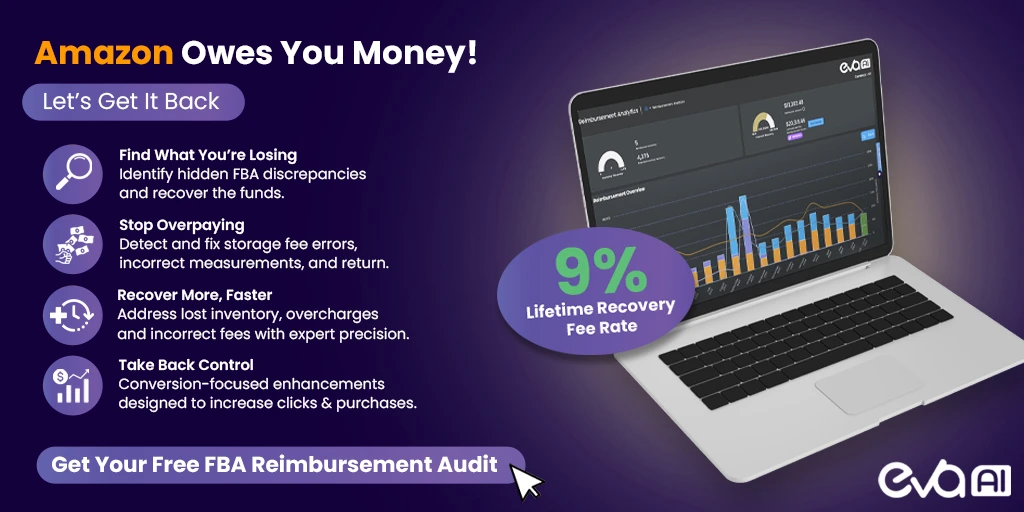Table of Contents
- Introduction:
- Why Sellers Need an Amazon Inventory Management Solution
- Common Pitfalls in Amazon Inventory Management
- Benefits of Automated Amazon Inventory Management
- Advanced Amazon Inventory Management Strategies
- The Power of Amazon’s Inventory System
- Understanding Amazon’s Distribution Network
- How EVA Can Help with Your Amazon Inventory Management
- Takeaways:
- Conclusion
- FAQs
Introduction:
The Hidden Secret to Amazon’s Success in e-commerce is often attributed to its customer-centric approach, but the real engine behind its success lies in its operational excellence and inventory management prowess.
Behind every swift delivery and vast product selection is a meticulously managed inventory system that ensures products are available, orders are fulfilled accurately, and customers are satisfied.
For sellers on Amazon, mastering inventory management is crucial. Proper inventory management can help you avoid stockouts, optimize your supply chain, and ultimately, increase your profitability.
Why Sellers Need an Amazon Inventory Management Solution
Effective inventory management is essential for any business, but for Amazon sellers, the stakes are even higher.
Even a small misstep in managing your inventory can lead to significant losses in sales, customer trust, and market share.
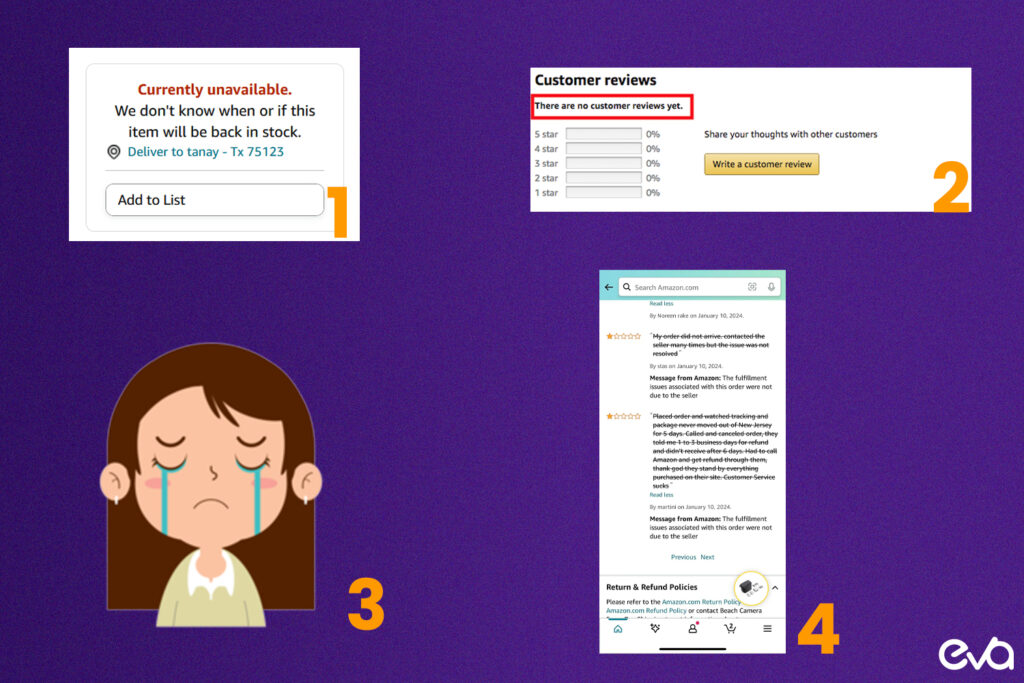
The Hazards of Running out of Amazon Inventory
Running out of stock on Amazon can disrupt your entire business operation. Here’s how:
- Lost Sales & Competitive Advantage: When your product is out of stock, you lose sales and your position in Amazon’s search rankings, making it easier for competitors to capture your market share.
- No New Product Reviews: Out-of-stock products miss out on potential reviews, hurting your long-term sales.
- Upset Customers: Stockouts lead to dissatisfied customers, negative reviews, and a tarnished brand reputation.
Preventing stockouts requires a strategic approach to inventory management. Here are some essential practices:
- Sales Channel Support: Ensure that your inventory management system supports multiple sales channels, allowing you to track stock levels across various platforms in real-time.
- Optimizing Integrations: Integrate your inventory management system with your other business tools, such as accounting software and CRM systems, to streamline operations and reduce errors.
Common Pitfalls in Amazon Inventory Management
While effective inventory management can propel your Amazon business to new heights, falling into common traps can lead to costly mistakes.
Understanding these pitfalls is the first step toward avoiding them.
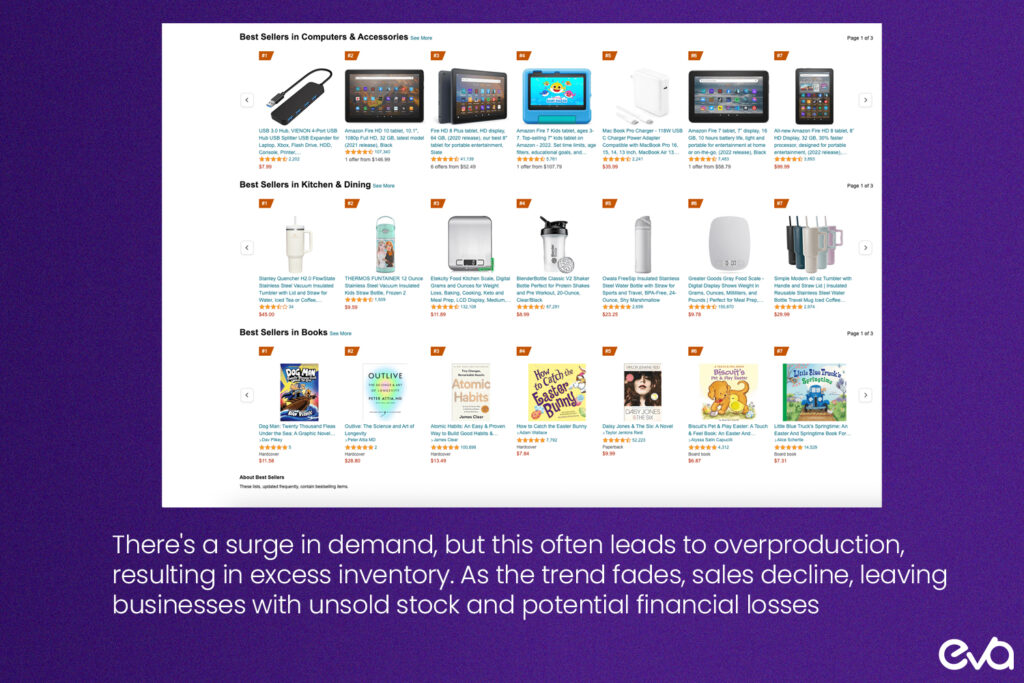
Don’t Fall For The ‘Hot Product’ Trap
Chasing trends and hot products can backfire if not executed properly. Here’s why:
- Volatile Demand: Hot products often experience a surge in demand followed by a rapid decline, leading to excess inventory that’s difficult to sell once the trend fades.
- Supply Chain Strain: Rapidly scaling up to meet demand can strain your supply chain, leading to delays and potential stockouts for other products.
Instead of chasing trends, focus on building a sustainable product portfolio with consistent demand.
The Hazards of Running out of Amazon Inventory
Restocking delays, increased costs, and inventory imbalances are common risks associated with stockouts. Maintaining a balanced approach to inventory replenishment is crucial to avoid these pitfalls.
Benefits of Automated Amazon Inventory Management
Automation has revolutionized many aspects of business operations, and inventory management is no exception.
Implementing automated systems can provide Amazon sellers with numerous benefits, from increased accuracy to significant time savings.
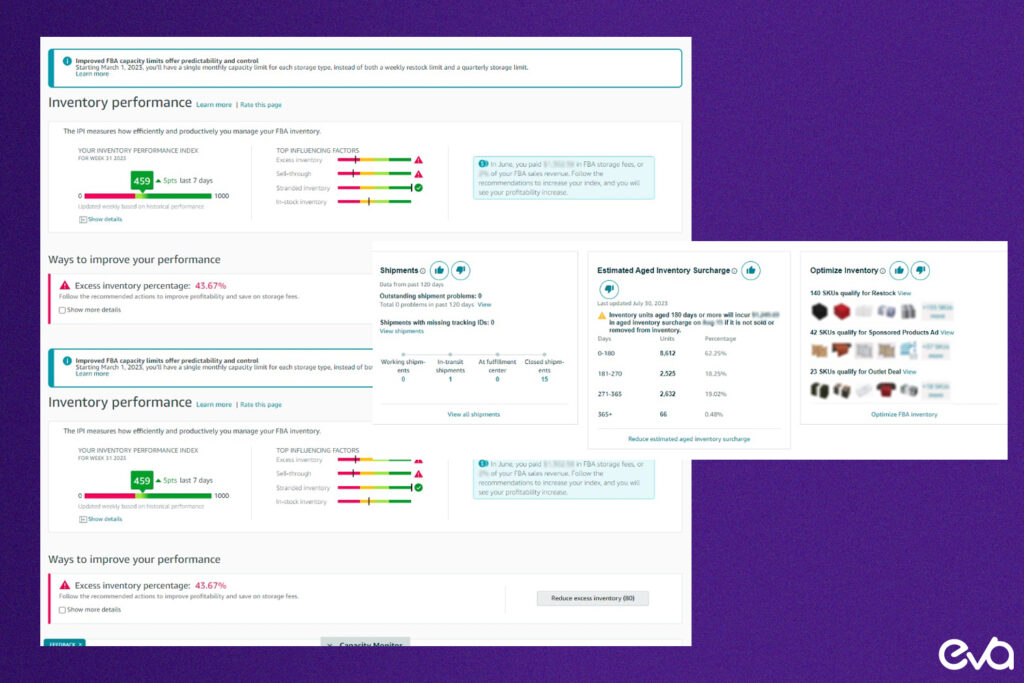
Automatic Updating of Inventory
One of the biggest advantages of automation is the automatic updating of inventory levels across all sales channels. Here’s how it works:
- Real-Time Adjustments: Automated systems adjust inventory levels in real-time as orders are placed and fulfilled, ensuring that your stock levels are always accurate.
- Reduced Human Error: Automation minimizes the risk of miscounts, incorrect data entry, and other mistakes that can lead to stockouts or overstocking.
Track Your Products in the Warehouse
Modern inventory management systems use technologies like RFID (Radio-Frequency Identification) and barcode scanning to monitor the movement of goods in real-time, offering improved accuracy and faster fulfillment.
Advanced Amazon Inventory Management Strategies
As your Amazon business grows, so do the complexities of managing your inventory. Implementing advanced strategies can help you optimize your operations, reduce costs, and stay competitive.
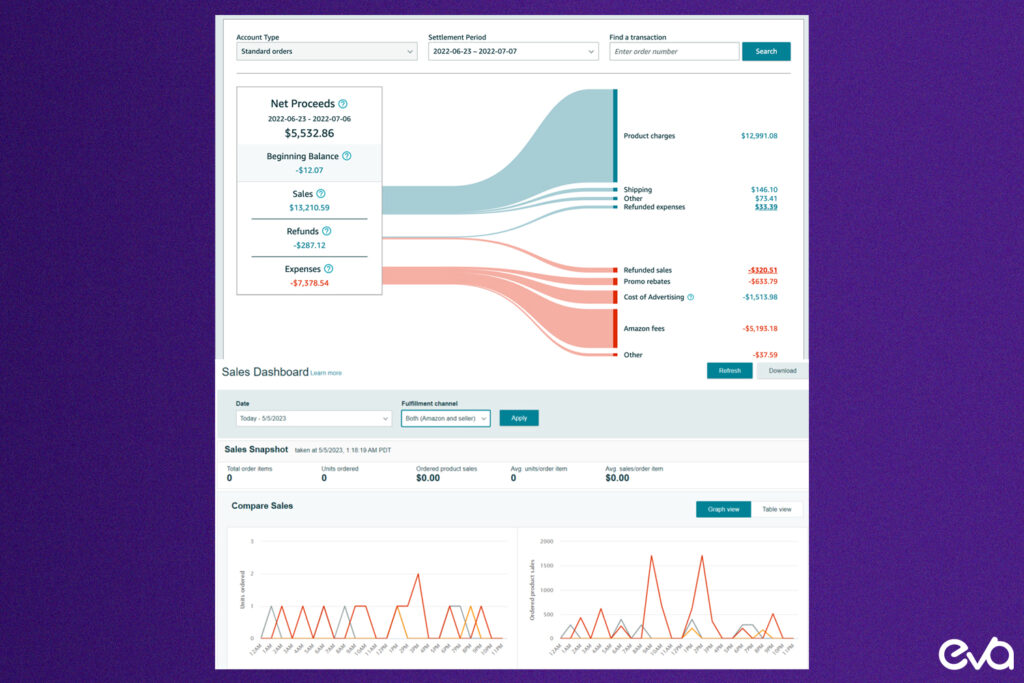
Improve Your Optimal Order Frequency
Determining the optimal order frequency is critical to maintaining a balanced inventory. Advanced systems can help you optimize your order frequency by:
- Demand Forecasting: Use historical sales data and predictive analytics to forecast demand accurately.
- Just-in-Time Inventory: Implement a just-in-time (JIT) inventory system to reduce holding costs and minimize the risk of overstocking.
Real-Time Financial Reporting
Accurate financial reporting is crucial for making informed business decisions. Advanced inventory management systems provide real-time financial reporting, offering insights into your inventory’s impact on your bottom line.
The Power of Amazon’s Inventory System
Amazon’s inventory system is a marvel of modern logistics, designed to handle massive volumes of products while ensuring accuracy, efficiency, and customer satisfaction.
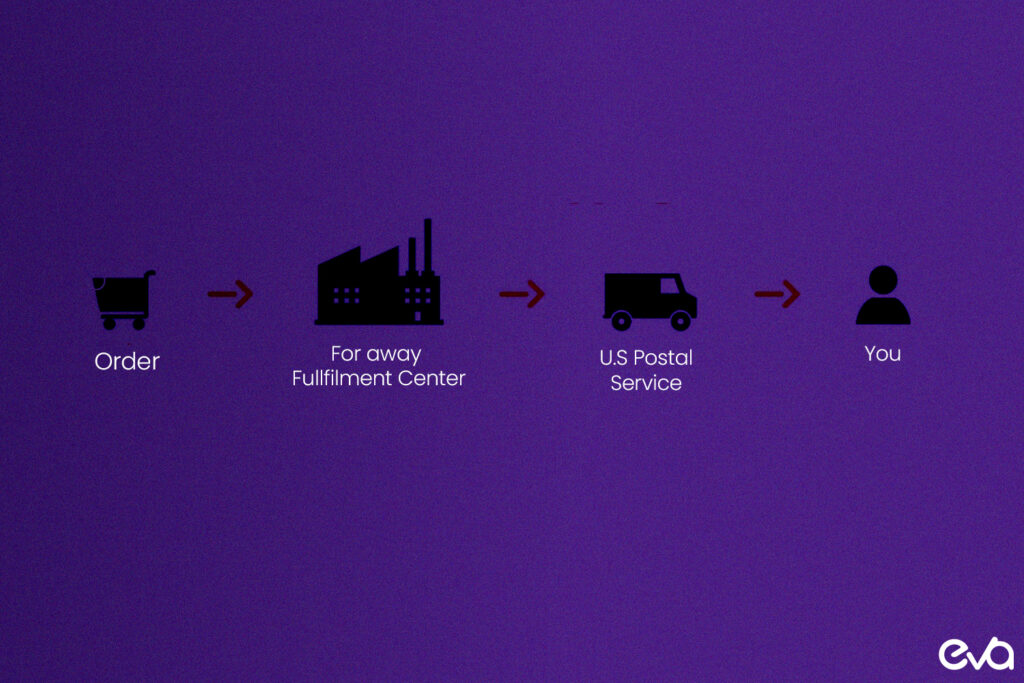
For sellers, understanding and leveraging this system can be a significant competitive advantage.
Amazon Inventory Optimization with Barcode Scanning
Barcode scanning allows for precise tracking of products from the moment they enter the warehouse until they are shipped to the customer, ensuring accuracy and speed in inventory management.
Strategic Shipping Practices & Data Collection
Adopting data-driven shipping practices similar to Amazon’s can help reduce costs and improve customer satisfaction.
Understanding Amazon’s Distribution Network
Amazon’s distribution network is one of the most advanced and efficient in the world. It’s designed to ensure that products are delivered quickly and accurately to customers, no matter where they are located.
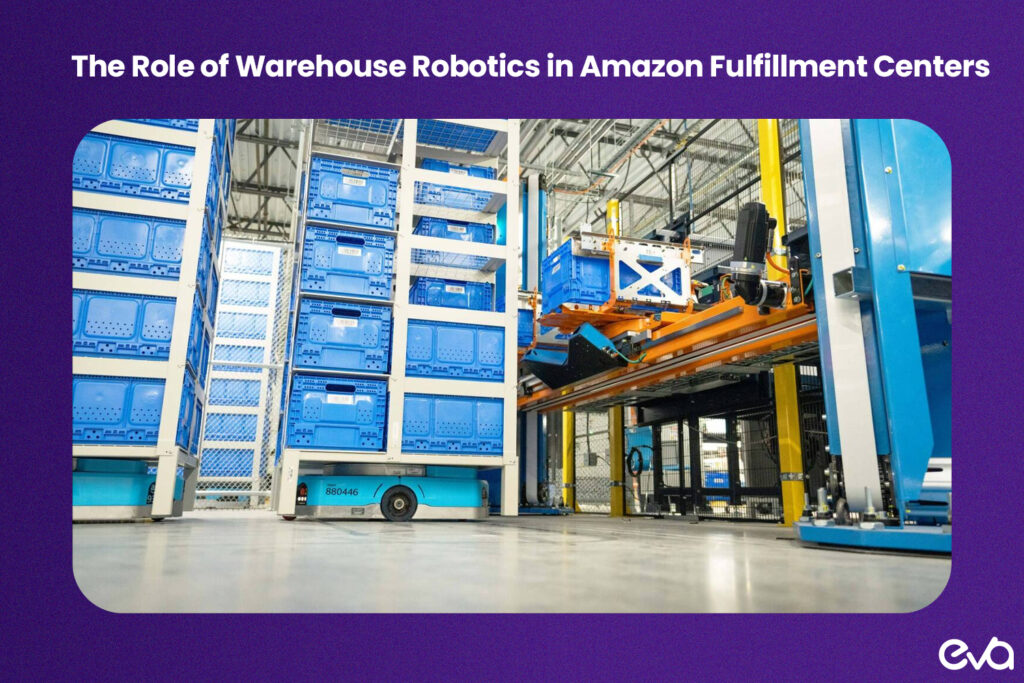
The Amazon System Divides its Distribution Network into 5 Types of Facilities:
- Crossdock Centers: Quick transfer of products from inbound to outbound trucks without long-term storage.
- Fulfillment Centers: Large warehouses where products are stored, picked, packed, and shipped.
- Sortation Centers: Packages are sorted by final destination and routed to the appropriate delivery stations.
- Delivery Stations: Final stop in the distribution network before packages reach the customer.
- Amazon Prime Now Hubs: Support Amazon’s Prime Now service with same-day delivery options.
How EVA Can Help with Your Amazon Inventory Management
Managing your Amazon inventory can be a daunting task, but Eva is designed to simplify and enhance the process.
This powerful platform offers a comprehensive suite of tools that help you streamline your inventory management, maximize your profitability, and stay competitive in the fast-paced Amazon marketplace.
Key Features of Eva
Eva equips Amazon sellers with essential features to optimize every aspect of inventory management:
- Dynamic Pricing and Repricing: Eva uses AI-driven algorithms to optimize your product pricing in real-time, ensuring you stay competitive while maximizing profits.
- Profitability and Cost Analysis: Gain deep insights into your costs and profits with Eva’s detailed analytics, helping you make informed decisions to improve your bottom line.
- Inventory Replenishment: Eva automates the inventory replenishment process by analyzing sales velocity and forecasting demand, ensuring that you always have the right amount of stock.
- Multi-Channel Integration: Eva supports seamless integration across multiple sales channels, allowing you to manage your inventory from a single, centralized platform.
- Comprehensive FBA Management: Eva simplifies FBA management by providing tools that help you track inventory levels, manage shipments, and optimize fulfillment processes.
By leveraging these features, Eva helps Amazon sellers manage their inventory more effectively, reduce operational costs, and increase profitability.
Takeaways:
- Inventory Management is Key: Proper management on Amazon is crucial for maintaining sales, customer satisfaction, and market presence.
- Automation Improves Efficiency: Automating inventory updates and replenishment helps reduce errors, save time, and optimize stock levels.
- Avoid Chasing Trends: Focus on products with steady demand rather than chasing trends that can lead to overstocking or running out of stock.
- Know Amazon’s Distribution Network: Understanding how Amazon’s facilities operate can help you optimize inventory management and improve delivery.
Conclusion
To thrive on Amazon, effective inventory management goes beyond just monitoring stock levels—it’s about anticipating demand, preventing disruptions, and refining every aspect of your supply chain.
Using tools like Eva allows sellers to streamline their operations, maintain customer satisfaction, and stay competitive.
By understanding Amazon’s inventory processes and applying advanced strategies, sellers can achieve and even surpass their business objectives on the platform.
Ready to take your Amazon business to the next level? Book a free consultation with Eva Commerce.
FAQs
It impacts sales, customer satisfaction, and market share. Proper management helps avoid stockouts, optimize supply chains, and increase profitability.
You risk losing sales, dropping in search rankings, missing product reviews, and upsetting customers.
Automation updates inventory in real-time, reduces errors, and speeds up warehouse operations through RFID and barcode scanning.
Chasing trending products can lead to overstocking or supply chain issues. Focus on products with consistent demand instead.
Eva optimizes pricing, analyzes costs, automates replenishment, integrates across channels, and manages FBA efficiently.
Eva uses AI to adjust pricing in real-time, keeping you competitive while maximizing profits.
It tracks products accurately from entry to shipment, ensuring quick and precise inventory management.
Eva automates replenishment by analyzing sales trends and forecasting demand, ensuring optimal stock levels.
Amazon uses Crossdock Centers, Fulfillment Centers, Sortation Centers, Delivery Stations, and Prime Now Hubs.
Eva streamlines inventory management, tracks stock across warehouses, and optimizes fulfillment, helping scale your business.

